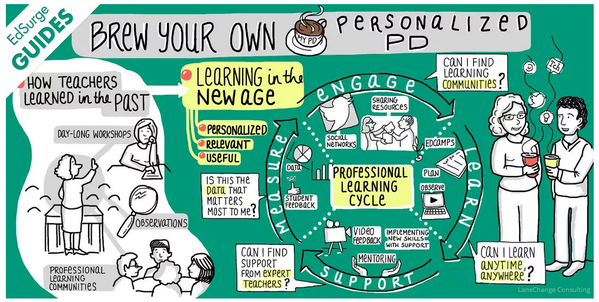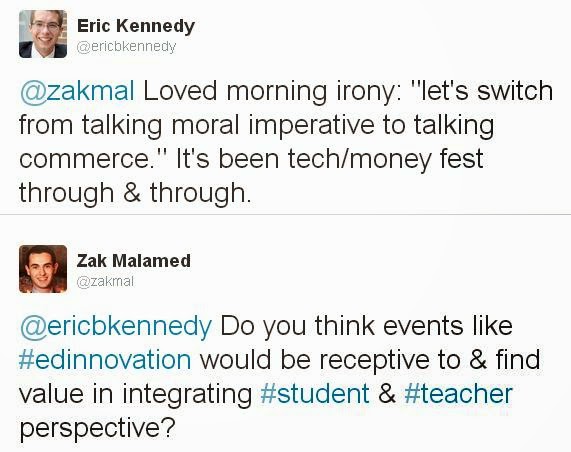There is some convergence with a topic within the various communities that I am involved with at the moment as there is a lot of discussion around the issue of Professional Development (PD).
- #EdTechChat highlighted that this was the most active discussion they had since the chat was established 12 months ago.
- EdSurge have just published a PD guide for educators
- #EdTechBridge is exploring some ideas to see what they can do to develop PD beyond this evenings' discussion via their Action Speaks Louder than Words campaign
- FE is looking for ways to engage educators more with EdTech with FELTAG
- I am always looking for ways to develop my own skills. At the moment this includes exploring the work of Community Managers... which involves producing good content
I want to help out with these PD initiatives, but I'm not an educator. I'm involved with EdTech, which is fine, EdSurge and EdTechBridge are aimed at EdTech as well as educators... and the #EdTechChat and #ukfechat communities seem keen to hear about my various ramblings. BUT... my experience and the roles I've had within the sector isn't exactly what you'd call a popular or welcome topic.
I'm always keen to point out the similarities that exist between all stakeholders and a, rather unfortunate, area where there is common ground is with attitudes about roles I've held in the past... It would appear that sales is universally loathed;
- Educators are sick and tired of being misled and mis-sold by a group of people who, collectively, they can tend to view as unscrupulous and greedy.
- CEO's and Managers are dependent on salespeople, but fear their power, which seems uncontrollable at times. The world of sales may overwhelm those who prefer the neater world of spreadsheets and financial plans. But need the sales in order to fill their spreadsheets!
- Whether within education or their own organisation techies seem to view salespeople with suspicion... at best! At worse they just downright despise them. Perhaps hardly surprising given introvert Vs extrovert & meticulous Vs "winging it" personality types.
Never put an Introvert in a Sale Job?
There is a dichotomy here for me personally. I have experience in sales, but don't think that I fit the stereotype (at least I hope not!), I certainly don't agree with any of "typical sales people" that I've met. I'm an introvert with a passion for Education and Technology, so don't disagree with some of the observations above. While the findings from "Teachers Know Best" do not surprise me, they are extremely concerning. And sales people must have played a role, right?
Sure, they might have. After all they are the people who sold the service. However, I have also had to deal with situations where all stakeholders have rounded on the sales team... even when this has been more than a little unwarranted. Sometimes they have been extremely unfair and entirely inaccurate!
Maybe an unscrupulous CEO (who is responsible for hiring & training his/her staff) blames the sales team when there are problems with their product. Or perhaps the Educator feels the sales person sold a "rubbish" or "complicated" product, but the educator did not have the right kind of PD and/or did not commit the recommended amount of time exploring the product?
The dislike for sales people seems to allow for a multiple of sins to be brushed over with a chorus of "It must have been the greedy, unethical sales person saying 'whatever he needed to' in order to close the deal and get commission"
Learning from Experience
Like it or not, sales is the area I have experience in. I am also keen to contribute to both EdSurge and EdTechBridge PD projects. I used to try to disguise the fact that I was in sales, and I'm not alone.
 The next time you are at an education conference which is supported by exhibitors take a look at the delegate list, and have a look at how many job titles have the word "sales" in it Vs "Business Development Manager," "Education Specialist" or "Partnerships Manager" etc.
The next time you are at an education conference which is supported by exhibitors take a look at the delegate list, and have a look at how many job titles have the word "sales" in it Vs "Business Development Manager," "Education Specialist" or "Partnerships Manager" etc.Today not only am I less bothered about being involved with sales, I am reasonably pleased with my experience and skill set. The reason? Because today I use whatever ability I have to support good ideas. I've helped drum up interest for some EdChats, I've supported EdTech companies that I have no association at all with. I have supported things simply because they were "good ideas" and what they offered seemed to fulfill a need.
So I am going to discuss an issue that I have experience with, even if no one likes this area of experience. Something that I hope to achieve is to demonstrate the knock on effect the current mindset and attitudes have on EdTech development;
1) People don't like sales, so
2) It gets treated separately from the EdTech ecosystem (by both Edu & EdTech), therefore
3) We tend not to discuss it... except to apportion blame when no one wants to admit to buying/producing bad EdTech. So "blaming sales" is the toxic dumping ground to mask bad decisions.
I think this is a mistake. Even taking the worst possible case scenario and we accept that the 50% of EdTech that is ineffective is the result of unethical sales people... At the very least, surely we need to ask "What on earth is the HR and training department doing?" I hope to shine a light on this and (attempt to) demonstrate how and why this is. I intend to write a few posts on the topic of "Sales Matters" starting with Sales Matters 101:
Sales Re-Orientation Class
Most courses have orientation classes... not this one. This is re-orientation! You see, everyone has a view on sales. When Philip Delves Broughton told friends that he was working on a book on sales half of his friends said "salespeople? Ugh" the other half said "Selling... It makes the world go round"
So today's class I'm going to do my best to disorientate you by questioning your views, opinions and perceptions, and ask you to consider questions like;
- Isn't education just a sales job... of sorts?
- Is education to blame for any unprofessional sales practices that exist?
- Why does Education ignore some sales organisations? Esp when;
i) The programs are extremely popular with the corporate world
ii) Some of these organisations are filling in the inadequacies of education
- A mixed message from Education... Love entrepreneurs; dislike sales people?
The divisive nature of sales and education can perhaps be demonstrated if you were to make the following comment in a busy staff room/staff meeting;
"The job of educator is really just a sales job... After all we need to "sell" the value of our subject to a (sometimes skeptical/disinterested) group of people and then present the subject in a convincing and memorable way? Discuss"
If you get anything like the reaction that I've had, you'll get some people "saying yeah, I suppose your right" and others disagreeing vehemently. "I spent years studying to be a teacher, and you're comparing my job to someone with no training and [insert any other expletive you like here]?!" I make the same point about training myself... although from a slightly different perspective.
I am not an educator, so I'll side step this debate and focus on my experiences as a parent. We continually reinforce the value of education to our kids, we encourage them to read and the house is full of books, I am rarely caught without having a book (or two) within arms reach. However, despite highlighting the benefits, leading by example and having some sales experience, it is still a huge struggle to "sell" reading... especially when my argument and pitch is up against XBox and Minecraft etc.
Sales People? Yuck! "I blame the... Educators?"
A quick question for any teacher who reacted negatively to the thought of Education being a sales job, I presume part of this negative reaction was because of some poor experiences with sales people? In that case... follow up question;
Who do you blame for the sales persons' behaviour? Is it nurture Vs nature? Was it genetics? Do you blame the parents? Or was it the CEO of the company and/or the sales training industry? What about the role education played? Or, to be more accurate, the role education didn't play!
How many university courses do you get on marketing, accounting, strategy, economics? Lots right? How many courses focus on sales?
Not only are there few stand alone courses on the topic, but it is absent from even the most prestigious MBA programs. When Philip Delves Broughton, the author of "Life's a Pitch," did his MBA at Harvard he said that sales was totally absent from the curriculum. Are there any consequences with such an omission? If so, what impact does it have?
It means that there is a void which is filled in the same way it has been since the 1900s "How to" books and biographies. Would you employ an accountant who's entire experience was "The Little Red Book of Accounting?" No? Of course you wouldn't! Yet the profession of sales can be entered into without even picking up a book on the subject. Positions are advertised as "No experience required" and that "Training will be provided"

We know what educators think of not having qualified teachers in the classroom, we also know that educators have concerns about how much influence employers can have with the development of some courses... Yet sales is a profession that you can walk in off the street with no qualifications of experience and get trained using the company's in-house methods.
How on earth are you supposed to get a consistently professional experience with this kind of model?!
Elite Sales Experience
I have never had any formal sales training of any description. Any philosophy I have is "a bit of a hodgepodge" through a process of trial and error, self-discovery and through reading about people and organisations that I admire.
If a student came to a careers advisor and said "I want to be the best sales person in XYZ industry" what would the advisor suggest they study, and where? Would the advice be to go on a course that the corporate world is a big fan of, but which academics tend to ignore... despite (or perhaps because of) the fact that they have successfully addressed some of the inefficiencies within our education system.
"Dale Carnegie is not a company taken seriously by academic students of business. But corporations and eminent business leaders seem to adore it." Life's a Pitch
I experienced this when I posted the Tweets that feature in this post. I got little or no interaction or engagement from educators... However, some extremely experienced and influential entrepreneurs & business leaders started following me.
The Art of the Sale... Entrepreneurs Selling themselves in Education
I am a huge fan of innovation in education and ethical and welcome engagement with educators. This approach has led to career in sales not doing too well at the moment (more on this in future "Sales Matters" posts). I'm considering getting in touch with some successful entrepreneurs to get some tips and advice.
I know that entrepreneurs are all the rage in education, with new programs springing up on a regular basis with various "celebrity entrepreneurs" support and endorsements. I find a number of things regarding this, how shall I put it... erm "curious" but, for the purposes of this post, will remain focused on the dichotomy here with sales and education.
There is something of a love affair for all things entrepreneur in education, but a disdain for what they do for a living. After all what is a successful entrepreneur, if not the consummate sales person? There may be much admiration for entrepreneurs even those "Lovable rouges" whose philosophy is "just get the sale done... never mind the customer" mentality when it features on The Apprentice and other shows. I think educators would be extremely intolerant of such behaviour if reps like this came calling in this way... Talk about a mixed message!
 But if you can't beat 'em... I think I'll check the EdSurge archives to see if they have ever featured any Viglen products... if they have, I think I'll apply to Lord Sugar's company for some sales training and see if it helps me engage with educators any better... Oh hang on a minute... what's this? Lord Sugar offloads faded PC builder Viglen to XMA, Erm maybe not!
But if you can't beat 'em... I think I'll check the EdSurge archives to see if they have ever featured any Viglen products... if they have, I think I'll apply to Lord Sugar's company for some sales training and see if it helps me engage with educators any better... Oh hang on a minute... what's this? Lord Sugar offloads faded PC builder Viglen to XMA, Erm maybe not!Based on this article, if successful business people like Lord Sugar can't make EdTech work, maybe I should just leave education too... but what to do?
Maybe I'll see if Guillermo "Memo" Ramirez has any jobs, because this Baltimore Building contractor knows all about exceptional sales practices! Perhaps Memo can build "The Institute of Sales" and I can apply for a job in the EdTech department. After all if teaching is a sales job... surely a tired old salesperson can try his hand a teaching. Surely it can't be any more demanding or confusing than this?































